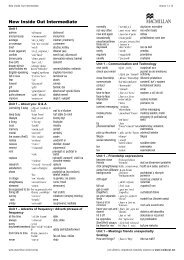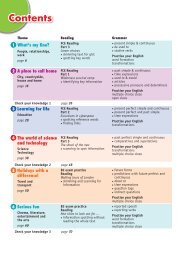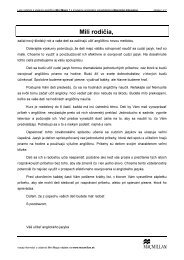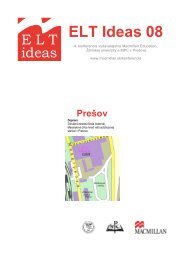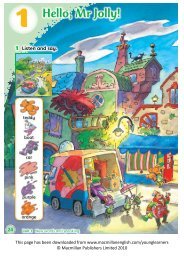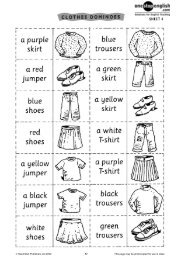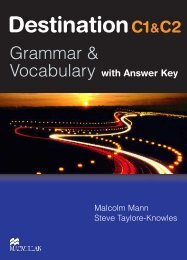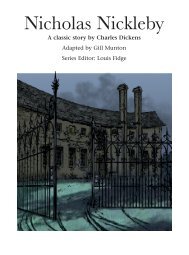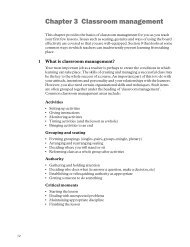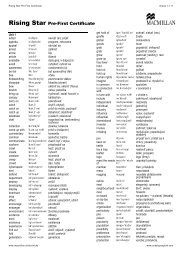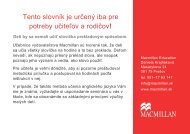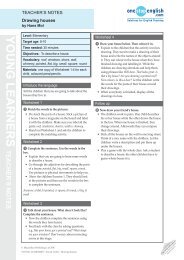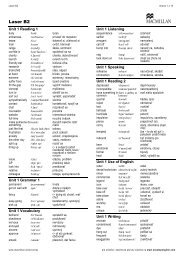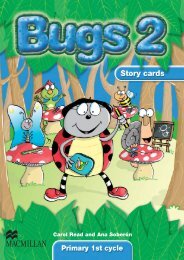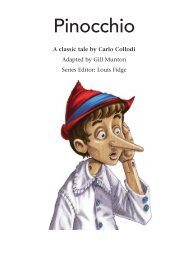ELT Ideas 06 - Macmillan Education
ELT Ideas 06 - Macmillan Education
ELT Ideas 06 - Macmillan Education
Create successful ePaper yourself
Turn your PDF publications into a flip-book with our unique Google optimized e-Paper software.
strana 4 z 6<br />
Target audience: LS, US, PLS<br />
Be Inspired<br />
Do we teach enough culture or is there no time left for this issue How to find the right and appropriate balance between the Slovak<br />
culture and the culture of Anglophone countries We will try to answer all the questions above and you can acquaint yourselves with<br />
the new activities which will help you to teach culture in your class.<br />
Target audience: LS, US, PLS, T<br />
Miss Textbook 20<strong>06</strong><br />
Have you ever chosen a text-book which did not fulfil your expectations Are you satisfied with your present text-book What criteria<br />
do you have for selecting your text-book During this presentation you will learn how to choose a text-book which would later become<br />
your “Miss”.<br />
Susan House<br />
Susan House works as a teacher trainer in various countries including Spain, Italy, Portugal, Colombia, Argentina and Brazil. She works<br />
for the local education authorities in the different regional administrations in Spain. Her areas of expertise include:<br />
Early reading skills and phonics.<br />
Process writing and creative writing.<br />
Common Language frameworks and portfolio assessment.<br />
CBI (Content based instruction).<br />
Assessment and evaluation (Oral and written).<br />
Bridging the gap (strategies for the transition from primary to secondary).<br />
She is the co-author of Story Magic, a primary course from <strong>Macmillan</strong>.<br />
House, Susan<br />
<strong>Macmillan</strong><br />
Target audience: P, LS<br />
Songs as a vehicle for language learning<br />
In this session we are going to look at ways of using songs for language learning both in terms of developing different skills and in<br />
terms of tracking language progression. We will be using songs to work with: memory, pronunciation and intonation, movement to<br />
demonstrate meaning, songs to work with the progression of language learning through oral recognition to free production of new<br />
language. There are a lot of songs available and it can be difficult to choose the most appropriate. We want to use songs that will<br />
maximise the possibilities of language learning so we will be working with songs that have been specially written for teaching English.<br />
Target audience: P, LS<br />
Talking tasks<br />
As we work through the target language for each unit of work there comes a point when we want the pupils to start using the language<br />
for oral communication so that it doesn’t just settle into some far corner of their minds as abstract theory. This means setting up an<br />
activity in which the pupils will use the target language to communicate with each other. Young learners find it much easier to do this if<br />
we set them up with a communicative purpose and especially if they have something physical to use. This is where cut outs and craft<br />
type activities come into their own in the classroom. In this session we will be looking at these activities and analysing the<br />
development of communicative skills.<br />
Target audience: P, LS<br />
Story based learning<br />
In this workshop we will be examining the following questions: What is story based learning – Why are stories are good vehicle for<br />
language learners – What are the characteristics of young learners – How do I tell a story – How can I address all the skills –<br />
How can I use multidisciplinary links – How can I integrate cross curricular issues We will be working with a story for primary school<br />
students and seeing how to exploit the story in the classroom.<br />
Hrašková, Eva<br />
freelance<br />
Target audience: P<br />
Little Bugs in our classrooms<br />
Being a teacher of 6-7 year olds sometimes reminds me of standing in the middle of a busy and noisy anthill. You can’t possibly get<br />
rid of them but there are some ways how to stop them „biting you“ and make your life easier. Just offer the ants what they like, bring<br />
their attention to something better than your nerves and you might be as happy as them. There are things and activities which always<br />
keep my children talking English (drilling some grammar or learning a nice bunch of new words while playing ) – and me feeling happy<br />
with my „little bugs“.<br />
Fergal Kavanagh<br />
Fergal first started collaborating with <strong>Macmillan</strong> in 1996, and has given talks throughout Italy, Bulgaria, Turkey and Ireland. This is his<br />
first visit to Slovakia. He currently teaches at the Università degli Studi di Napoli ”L’Orientale”, Italy, but through his website<br />
www.tuneintoenglish.com he promotes the use of songs as his preferred method of teaching.<br />
Kavanagh, Fergal<br />
<strong>Macmillan</strong><br />
Target audience: US, PLS<br />
Inspiration<br />
Thomas Edison said "Genius is one percent inspiration, ninety-nine percent prespiration". The great inventor died in 1931, but if he<br />
were alive to see <strong>Macmillan</strong>'s latest title, he would certainly greatly reduce the ratio - using Inspiration in the classroom will reduce<br />
your students' English language learning prespiration! We take you through a sample unit to show you how to get the most from the<br />
book.



